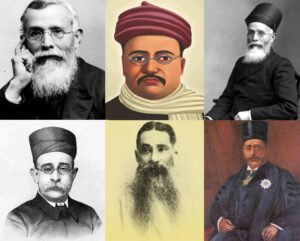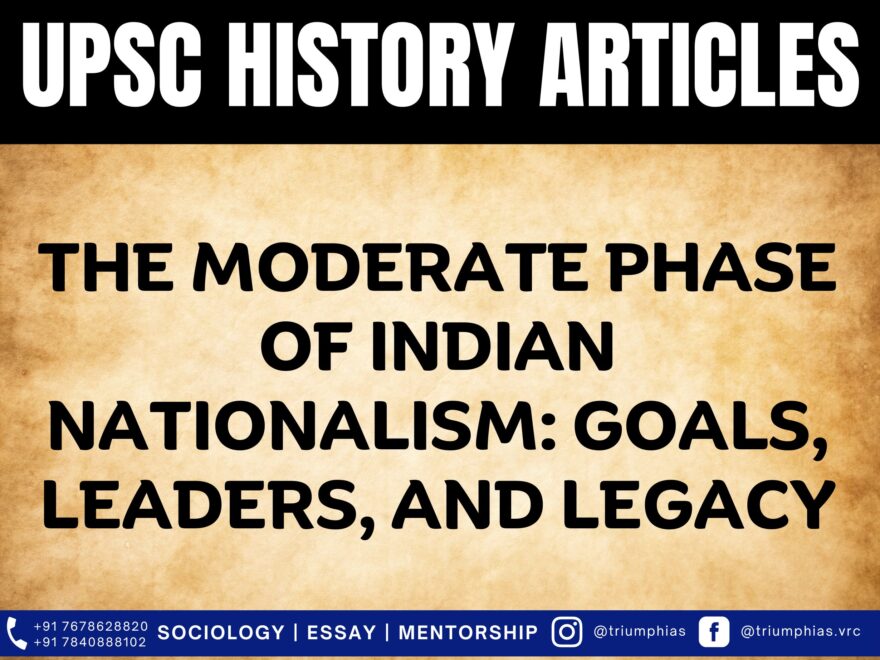Moderate
(Relevant for Historical Section of General Studies Paper Prelims/Mains)

Moderates
The initial phase of the Congress’s existence is referred to as the moderate phase (1885-1905). During this period, the Congress pursued limited goals and placed a significant emphasis on strengthening its organizational structure. Prominent national leaders like Dadabhai Naoroji, P.N. Mehta, D.E. Wacha, W.C. Banerji, S.N. Banerji, and Gopal Krishna Gokhale, who steered Congress policies during this era, were staunch advocates of liberalism and moderate politics, earning them the label of “moderates.”
The primary objective of the Moderates was to attain self-governance within the framework of the British Empire. They advocated for patience and reconciliation rather than resorting to violence or confrontation, placing their trust in constitutional and non-violent methods to accomplish their objectives.
Methods of political work of the moderate leaders
They conducted gatherings and dialogues on subjects related to society, economy, and culture with the aim of enlightening the populace, awakening their political awareness, and shaping public sentiment.
They arranged yearly conventions that attracted representatives from across the nation. Following these deliberations, they endorsed resolutions, which were then submitted to the Government for its consideration and suitable measures.
Success/Contributions of Moderates
- They embodied the most progressive elements of their era.
- They succeeded in fomenting a widespread national awakening, uniting all Indians under a common cause against a shared adversary, and instilling a sense of belonging to a single nation.
- They imparted political education to the populace and popularized contemporary ideas.
- They exposed the fundamentally exploitative nature of colonial rule, eroding its moral legitimacy.
- Their political activism was grounded in concrete realities rather than superficial sentiments or religious motivations.
- They established the fundamental truth that India should be governed in the interests of its own people.
- They laid a robust foundation for a more dynamic, militant, and mass-oriented national movement in the subsequent years.
- The early nationalists made significant contributions to stoking nationalistic sentiments, even though they struggled to mobilize the masses and expand the scope of their demands.
- They failed to grasp the true essence of British colonial rule.
- The moderate phase of the national movement had a limited social support base, and the masses played a passive role.
- This was primarily because the early nationalists lacked confidence in the political potential of the masses. They believed that Indian society was rife with divisions and sub-divisions, with the masses being generally ignorant and holding conservative beliefs.
- The Moderates believed that these disparate elements needed to be united into a single nation before engaging in politics. However, they overlooked the fact that it was through a struggle for freedom and political participation that these diverse elements could coalesce.
- Due to the absence of mass involvement, the Moderates were unable to adopt aggressive political stances against the authorities. The later nationalists diverged from the Moderates precisely on this issue. Nevertheless, the early nationalists represented the nascent Indian nation in opposition to colonial interests.
- Strategies like prayer, petitions, and protests proved ineffective.
- The partition of Bengal occurred against the wishes of the people.
Moderates wanted to educate people in modern politics, to arouse national and political consciousness and to create a united public opinion on political questions. Their critics often accuse them for using methods of beggary through prayers and petitions.
However, had they adopted revolutionary or violent methods, they would have been crushed right in the infancy of the Congress. They created a solid base for a more vigorous, militant, mass-based national movement in the following years. The Moderates thus were prudent in using the constitutional and peaceful methods to handle British rule.
Sample Question for UPSC Sociology Optional Paper:
-
Question: Who were the prominent leaders associated with the moderate phase of Indian nationalism?
Answer: Prominent leaders included Dadabhai Naoroji, P.N. Mehta, D.E. Wacha, W.C. Banerji, S.N. Banerji, and Gopal Krishna Gokhale. - Question: What were the primary objectives of the Moderate leaders in the Indian National Congress during their era?
Answer: The Moderates aimed to attain self-governance within the British Empire through constitutional and non-violent means. -
Question: What methods did the Moderate leaders employ to promote political awareness and unity among Indians?
Answer: They conducted gatherings, dialogues, and yearly conventions to enlighten the populace, shape public sentiment, and submit resolutions to the Government. - Question: What contributions did the Moderates make to the Indian national movement?
Answer: They fostered national awakening, exposed the exploitative nature of colonial rule, and laid the foundation for a more dynamic and mass-oriented national movement. -
Question: Why did the Moderates refrain from adopting revolutionary or violent methods against British rule?
Answer: They believed that such methods would lead to their immediate suppression and instead focused on creating a united public opinion and political consciousness through constitutional and peaceful means.
To master these intricacies and fare well in the Sociology Optional Syllabus, aspiring sociologists might benefit from guidance by the Best Sociology Optional Teacher and participation in the Best Sociology Optional Coaching. These avenues provide comprehensive assistance, ensuring a solid understanding of sociology’s diverse methodologies and techniques.
Moderates, Indian Nationalism, Indian National Congress, Liberalism, Non-violence, National Awakening, Political Education, Colonial Rule, Mass Movement, Political Consciousness, National Unity, Moderates, Indian Nationalism, Indian National Congress, Liberalism, Non-violence, National Awakening, Political Education, Colonial Rule, Mass Movement

Choose The Best Sociology Optional Teacher for IAS Preparation?
At the beginning of the journey for Civil Services Examination preparation, many students face a pivotal decision – selecting their optional subject. Questions such as “which optional subject is the best?” and “which optional subject is the most scoring?” frequently come to mind. Choosing the right optional subject, like choosing the best sociology optional teacher, is a subjective yet vital step that requires a thoughtful decision based on facts. A misstep in this crucial decision can indeed prove disastrous.
Ever since the exam pattern was revamped in 2013, the UPSC has eliminated the need for a second optional subject. Now, candidates have to choose only one optional subject for the UPSC Mains, which has two papers of 250 marks each. One of the compelling choices for many has been the sociology optional. However, it’s strongly advised to decide on your optional subject for mains well ahead of time to get sufficient time to complete the syllabus. After all, most students score similarly in General Studies Papers; it’s the score in the optional subject & essay that contributes significantly to the final selection.
“A sound strategy does not rely solely on the popular
Opinion of toppers or famous YouTubers cum teachers.”
It requires understanding one’s ability, interest, and the relevance of the subject, not just for the exam but also for life in general. Hence, when selecting the best sociology teacher, one must consider the usefulness of sociology optional coaching in General Studies, Essay, and Personality Test.
The choice of the optional subject should be based on objective criteria, such as the nature, scope, and size of the syllabus, uniformity and stability in the question pattern, relevance of the syllabic content in daily life in society, and the availability of study material and guidance. For example, choosing the best sociology optional coaching can ensure access to top-quality study materials and experienced teachers. Always remember, the approach of the UPSC optional subject differs from your academic studies of subjects. Therefore, before settling for sociology optional, you need to analyze the syllabus, previous years’ pattern, subject requirements (be it ideal, visionary, numerical, conceptual theoretical), and your comfort level with the subject.
This decision marks a critical point in your UPSC – CSE journey, potentially determining your success in a career in IAS/Civil Services. Therefore, it’s crucial to choose wisely, whether it’s the optional subject or the best sociology optional teacher. Always base your decision on accurate facts, and never let your emotional biases guide your choices. After all, the search for the best sociology optional coaching is about finding the perfect fit for your unique academic needs and aspirations.
To master these intricacies and fare well in the Sociology Optional Syllabus, aspiring sociologists might benefit from guidance by the Best Sociology Optional Teacher and participation in the Best Sociology Optional Coaching. These avenues provide comprehensive assistance, ensuring a solid understanding of sociology’s diverse methodologies and techniques. Sociology, Social theory, Best Sociology Optional Teacher, Best Sociology Optional Coaching, Sociology Optional Syllabus.
Best Sociology Optional Teacher, Sociology Syllabus, Sociology Optional, Sociology Optional Coaching, Best Sociology Optional Coaching, Best Sociology Teacher, Sociology Course, Sociology Teacher, Sociology Foundation, Sociology Foundation Course, Sociology Optional UPSC, Sociology for IAS,
Follow us :


https://t.me/VikashRanjanSociology
Find More Blogs
|
Scope of the subject and comparison with other social sciences |
|||
|
|
|
|
Modernity and social changes in Europe |

